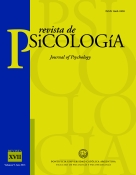Personalidad y bienestar psicológico: un estudio en universitarios chilenos
Palabras clave:
bienestar psicológico, personalidad, diferencias de géneroResumen
El presente estudio, de tipo descriptivo-correlacional por encuesta, tuvo como propósito examinar la relación entre el modelo multidimensional de bienestar psicológico de Ryff y el modelo de los cinco factores de personalidad en estudiantes universitarios. Para ello se aplicaron las Escalas de Bienestar Psicológico y el Inventario de los Cinco Grandes a 315 estudiantes de pregrado de la Universidad de Concepción (Chile). Los resultados mostraron que, tal como se predecía, el bienestar psicológico y sus dimensiones se relacionaron de forma inversa con el Neuroticismo y de forma directa con los restantes factores de personalidad, y que los factores de Responsabilidad y Neuroticismo eran los que tenían mayor influencia en el bienestar psicológico. También se encontraron diferencias a favor de las mujeres en Neuroticismo, Amabilidad y Responsabilidad.Descargas
Citas
Abbott, R., Croudace, T., Ploubidis, G., Kuh, D., Richards, M. & Huppert, F. (2008). The relationship between early personality and midlife psychological wellbeing: Evidence from a UK birth cohort study. Social Psychiatric and Psychiatric Epidemiology, 43, 679-687.
Ahrens, C. & Ryff, C. (2006). Multiple roles and well-being: Sociodemographic and psychological moderators. Sex Roles, 55, 801-815.
Bardi, A. & Ryff, C. (2007). Interactive effects of traits on adjustment to a life transition. Journal of Personality, 75, 955-983.
Barra, E. (2010). Bienestar psicológico y orientación de rol sexual en estudiantes universitarios, Terapia Psicológica, 28, 119-125.
Barra, E. (2012). Influencia de la autoestima y del apoyo social percibido sobre el bienestar psicológico de estudiantes universitarios chilenos. Diversitas. Perspectivas en Psicología, 8, 29-38.
Chico, E. (2006). Personality dimensions and subjective well-being. The Spanish Journal of Psychology, 9, 38-44.
Contreras, F., Espinosa, J.C. & Esguerra, G. (2009). Personalidad y afrontamiento en estudiantes universitarios. Universitas Psychologica, 8, 311-322.
Cova, F. (2004). Diferencias de género en bienestar y malestar emocional: Evidencias contradictorias. Terapia Psicológica, 22, 165-169.
De Miguel, A. (2005). Diferencias de edad y género en el NEO-PI-R en dos muestras con distinto nivel académico. International Journal of Psychology and Psychological Therapy, 1, 13-31.
Deci, E. & Ryan, R. (2008). Hedonia, eudaimonia, and well-being: An introduction. Journal of Happiness Studies, 9, 1-11.
Díaz, D., Rodríguez-Carvajal, R., Blanco, A., Moreno-Jiménez, B., Gallardo, I. &
Valle, C. (2006). Adaptación española de las escalas de bienestar psicológico de Ryff. Psicothema, 18, 572-577.
Diener, E., Suh, E., Lucas, R. & Smith, H. (1999). Subjective well-being: Three decades of progress. Psychological Bulletin, 125, 272-302.
Eysenck, H. J. (1990). Genetic and environmental contributions to individual differences: The three major dimensions of personality. Journal of Personality, 58, 245-261.
Gómez, V., Krings, F., Bangerter, A. & Grob, A. (2009). The influence of personality and life events on subjective well-being from a life span perspective. Journal of Research in Personality, 43, 345-354.
Grant, S., Langan-Fox, J. & Anglim, J. (2009). The big five traits as predictors of subjective and psychological well-being. Psychological Reports, 105, 205-231.
Hayes, N. & Joseph, S. (2003). Big 5 correlates of three measures of subjective well-being. Personality and Individual Differences, 34, 723-727.
John, O. & Srivastava, S. (1999). The bigfive trait taxonomy: History, measurement, and theoretical perspectives. En L. Pervin & O. John (eds.), Handbook of personality: Theory and research (2nd ed.) (pp. 102-138). New York, EEUU: Guilford.
Keyes, C., Shmotkin, D. & Ryff, C. (2002). Optimizing well-being: The empirical encounter of two traditions. Journal of Personality and Social Psychology, 82, 1007-1022.
Lindfors, P., Berntsson, L. & Lundberg, U. (2006). Factor structure of Ryff’s psychological well-being scales in Swedish female and male white-collar workers. Personality and Individual Differences, 40, 1213-1222.
Linley, P., Maltby, J., Wood, A., Osborne, G. & Hurling, R. (2009). Measuring happiness: The higher order factor structure of subjective and psychological well-being measures. Personality and Individual Differences, 47, 878-884.
Lippa, R. (2010). Sex differences in personality traits and gender-related occupational preferences across 53 nations: Testing evolutionary and social-environmental theories. Archives of Sexual Behavior, 39, 619-636.
McCrae, R. (2002). The maturation of personality psychology: Adult personality development and psychological wellbeing. Journal of Research in Personality, 36, 307-317.
Reid, A. (2004). Gender and sources of subjective well-being. Sex Roles, 51, 617-629.
Rubinstein, G. (2005). The big five among male and female students of different faculties. Personality and Individual Differences, 38, 1495-1503.
Ruini, C., Ottolini, F., Rafanelli, C., Tossani, E., Ryff, C. & Fava, G. (2003). The relationship of psychological well-being to distress and personality. Psychotherapy and Psychosomatics, 72, 268-275.
Ryff, C. (1989). Happiness is everything, or is it? Explorations on the meaning of psychological well-being. Journal of Personality and Social Psychology, 57, 1069-1081.
Ryff, C. & Singer, B. (2008). Know thyself and become what you are: An eudaimonic approach to psychological wellbeing. Journal of Happiness Studies, 9, 13-39.
Schmitt, D., Realo, A., Voracek, M. & Allik, J. (2008). Why can’t a man be more like a woman? Sex differences in big five personality traits across 55 Cultures. Journal of Personality and Social Psychology, 94, 168-182.
Schmutte, P. & Ryff, C. (1997). Personality and well-being: Reexamining methods and meanings. Journal of Personality and Social Psychology, 73, 549-559.
Sheldon, K. & Hoon, T. (2007). The multiple determination of well-being: Independent effects of positive traits, needs, goals, selves, social supports, and cultural contexts. Journal of Happiness Studies, 8, 565-592.
Valle, M., Beramendi, M. & Delfino, G. (2011). Bienestar psicológico y social en jóvenes universitarios argentinos. Revista de Psicología, 7, 7-26.
Van Dierendonck, D. (2005). The construct validity of Ryff’s scales of psychological well-being and its extension with spiritual well-being. Personality and Individual Differences, 36, 629-643.
Van Dierendonck, D., Díaz, D., Rodríguez- Carvajal, R., Blanco, A. & Jiménez, B. (2008). Ryff’s six-factor model of psychological well-being. A Spanish exploration. Social Indicators Research, 87, 473-479.
Vivaldi, F. & Barra, E. (2012). Bienestar psicológico, apoyo social percibido y percepción de salud en adultos mayores. Terapia Psicológica, 30, 23-29.
Wood, A., Joseph, S. & Maltby, J. (2009). Gratitude predicts pychological wellbeing above the big five facets. Personality and Individual Differences, 46, 443-447.
Descargas
Publicado
Cómo citar
Número
Sección
Licencia














